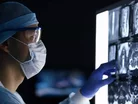TumourVue: groundbreaking AI imaging to tackle brain tumours

A new AI-driven imaging device has the potential to dramatically improve surgical outcomes for brain tumour patients and reduce costs at the same time. Anne Blackwood, Chief Executive at Health Enterprise East, tells us more.
The incidence of brain tumours is increasing around the world. Additionally the 5-year survival rate for people with a brain tumour is around 36%, and survival rates decrease with age.
“Key to successful brain tumour surgery is achieving ‘safe resection’ so as to preserve the neurological status of the patient, to reduce the need for aggressive post-operative chemotherapy and radiotherapy and to minimise chances of local recurrence” Blackwood explains. “However, with brain tumours typically extending into surrounding brain tissue, safe resection is not always possible.”
TumourVue was founded in 2018 by two academics from the University of Cambridge who were determined to address this problem: Dr Gita Khalili Moghaddam and Professor Chris Lowe. Backed by funding from Health Enterprise East’s (HEE) joint venture the Medtech Accelerator, the team are collaborating with Cambridge University Hospitals to create an innovative platform that integrates artificial intelligence.
How TumourVue works
TumourVue has a camera chip with an augmented reality capability within a clip-on device, that can be attached to safety or prescription glasses worn by the surgeon. Using AI, the new imaging mode is able to detect disparities in the characteristics of a tumour and normal tissue.
The colour-coded image, which is continually updated during surgery, allows neurosurgeons to access precise visualisation of tumour margins in real-time.
“As well as improving patient outcomes, TumourVue has the potential to offer substantial cost savings” Blackwood said. “Unlike current imaging techniques, it does not require the use of a UV light source or a pre-operative injection of a fluorescent dye.”
A financial study by HEE found that TumourVue could potentially save the UK’s NHS around £4.2 million a year.
Since receiving their proof-of-concept award from the Medtech Accelerator, TumourVue have been developing their handheld working prototype with product design engineering specialists. Blackwood says that the next stage of development will see TumourVue explore iterations, ranging from a handheld device with integrated computer vision to a wearable device with augmented reality in the form of 3D holographic features.
Although plans have been slowed by the pandemic, the team has recently received permission to resume image acquisition with the aim of reaching 50 patients by the end of 2021. This activity is funded by the Medtech Accelerator Award. A separate study later this year will add data and recommendations from 12 neurosurgeons.
In addition, a further study later this year will gather data and user development recommendations from 12 neurosurgeons.
Blackwood explains that the delay and cancellation of cancer procedures as a result of the pandemic is taking a terrible physical and emotional toll on thousands of patients and their families, but there is cause for optimism. “We know of many skilled clinicians and product developers who are working tirelessly to develop new technologies specifically geared towards cancer care.
“We look forward to seeing what trailblazers like the team at TumourVue can achieve in the months ahead, as they exploit the many possibilities offered by next generation technologies, such as AI, augmented reality, and robotics.”



